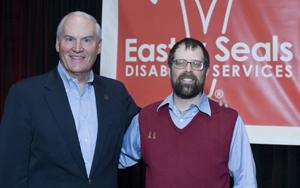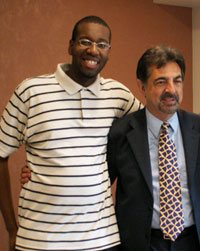Autism Society of America Conference
by Patricia Wright
I’ve been home a few days and am still sorting through all the information I gathered and the business cards I collected over the past weekend. I made so many wonderful contacts at the Autism Society of America (ASA) Conference! The three days that I spent learning and sharing were fantastic. The ASA conference is a great place to learn about what others are doing and share what is happening at Easter Seals.
I think one of the best features of the ASA Conference is how many individuals with autism attend. While spending time at the Easter Seals booth — or attending social events at the conference — individuals with autism were always around, an active presence at the conference.
I had the pleasure of sharing a van ride with James Williams who shared his perspective on the conference. When I asked him what he prefers about the ASA conference, James said, “The ASA conference is accepting.” I would absolutely agree. James spoke at last year’s ASA Conference. My colleague Ellen Harrington-Kane’s blog about James is here.







 We at Easter Seals have a special connection to
We at Easter Seals have a special connection to  Friday, June 13 turned out to be a lucky day for Easter Seals Metropolitan Chicago. Emmy and Tony Award winner
Friday, June 13 turned out to be a lucky day for Easter Seals Metropolitan Chicago. Emmy and Tony Award winner